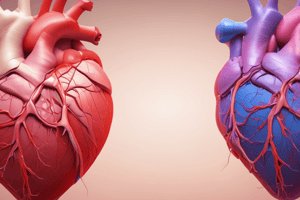Podcast
Questions and Answers
What is the main cause of angina?
What is the main cause of angina?
- Partial obstruction or spasm of the arteries supplying blood to the heart muscle (correct)
- Anemia
- Abnormal heart rhythms
- Heart failure
What is the relationship between severity of angina and degree of oxygen deprivation in the heart muscle?
What is the relationship between severity of angina and degree of oxygen deprivation in the heart muscle?
- Severity of angina always matches the degree of oxygen deprivation to the heart
- There is no relationship between severity of angina and degree of oxygen deprivation in the heart muscle
- Severity of angina always indicates the risk of a heart attack
- There is a relationship between severity of angina and degree of oxygen deprivation in the heart muscle (correct)
What is the most common symptom of angina?
What is the most common symptom of angina?
- Shortness of breath
- Chest pain or pressure (correct)
- Nausea
- Dizziness
What does the term 'angina' translate to?
What does the term 'angina' translate to?
What is the main mechanism of coronary artery obstruction in angina?
What is the main mechanism of coronary artery obstruction in angina?
What is the main cause of angina?
What is the main cause of angina?
What is the literal translation of the term 'angina'?
What is the literal translation of the term 'angina'?
What is the relationship between severity of angina and degree of oxygen deprivation in the heart muscle?
What is the relationship between severity of angina and degree of oxygen deprivation in the heart muscle?
What is the most common symptom of angina?
What is the most common symptom of angina?
What is the term used to describe chest pain or pressure caused by insufficient blood flow to the heart muscle?
What is the term used to describe chest pain or pressure caused by insufficient blood flow to the heart muscle?
What is the main mechanism of coronary artery obstruction in angina?
What is the main mechanism of coronary artery obstruction in angina?
What is the most common cause of angina?
What is the most common cause of angina?
What is the main mechanism of coronary artery obstruction in angina?
What is the main mechanism of coronary artery obstruction in angina?
What is the Latin translation of the term 'angina'?
What is the Latin translation of the term 'angina'?
What is the relationship between severity of angina and degree of oxygen deprivation in the heart muscle?
What is the relationship between severity of angina and degree of oxygen deprivation in the heart muscle?
Flashcards are hidden until you start studying
Study Notes
Angina Causes and Mechanisms
- The main cause of angina is the obstruction of coronary arteries, leading to insufficient blood flow and oxygen supply to the heart muscle.
- The main mechanism of coronary artery obstruction is the buildup of plaque, which narrows the arteries and reduces blood flow.
Angina Symptoms and Characteristics
- The most common symptom of angina is chest pain or pressure, often described as a squeezing or crushing sensation.
- The term "angina" translates to "strangling" or "choking" in Latin, which reflects the sensation of chest pain or pressure.
- The severity of angina is directly related to the degree of oxygen deprivation in the heart muscle.
Angina Definition
- Angina is a term used to describe chest pain or pressure caused by insufficient blood flow to the heart muscle.
- The literal translation of the term "angina" is "strangling" or "choking".
Studying That Suits You
Use AI to generate personalized quizzes and flashcards to suit your learning preferences.




